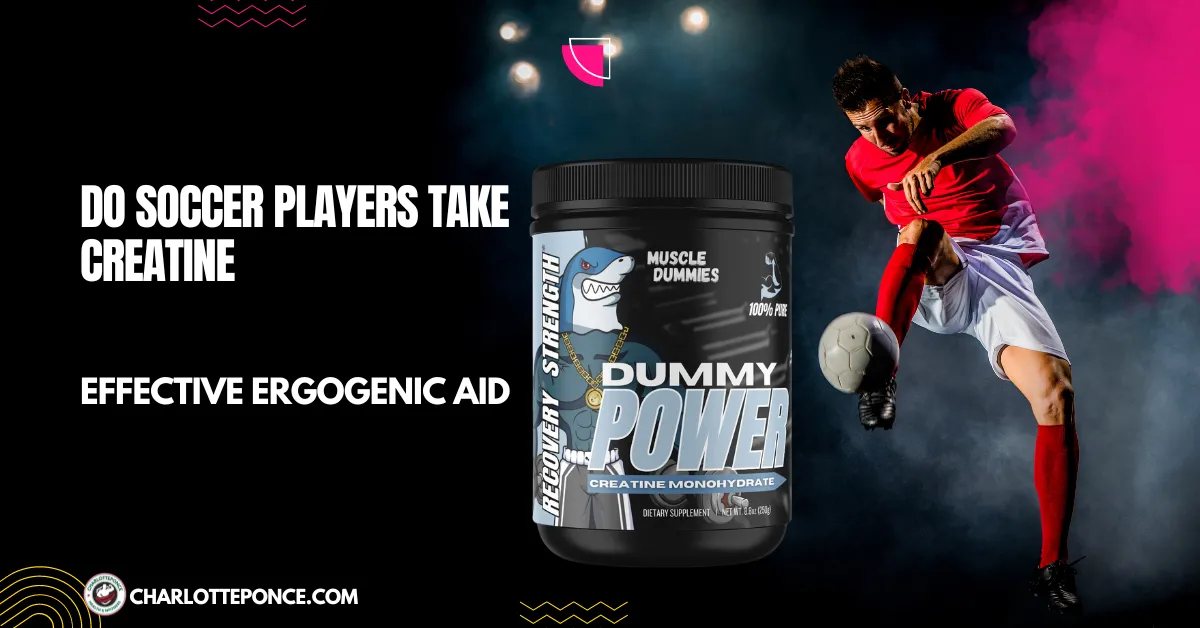Do Soccer Players Take Creatine? Soccer players may take creatine as a supplement to enhance their performance on the field. This is because creatine has been found to be an effective ergogenic aid in improving the anaerobic performance of athletes, which can be beneficial in soccer.
While not as prevalent in soccer as in other sports, some athletes incorporate creatine into their training regimen to potentially improve their power, speed, and endurance. Additionally, it is important to note that creatine is not a banned substance by Olympic or World Anti-Doping Agency standards, making it permissible for athletes to use under the guidance of a healthcare professional.

Page Contents
ToggleExploring Creatine Use In Soccer Players
Research On Creatine Supplementation
Several studies have examined the effects of creatine supplementation on soccer players. The research has shown promising results, indicating that creatine can be beneficial for soccer athletes.
Benefits Of Creatine For Soccer Players
Creatine offers various benefits to soccer players, such as improved muscle strength, power, and sprint performance. Additionally, it aids in enhancing overall endurance and recovery, contributing to better on-field performance.
Considerations For Soccer Players
Creatine supplementation is a popular option for many athletes looking to enhance their performance. However, when it comes to soccer players, there are several considerations to take into account before deciding whether or not to incorporate creatine into their training regimen. Understanding the potential side effects of creatine, as well as the appropriate dosage and timing recommendations, is crucial for soccer players.
Potential Side Effects Of Creatine
Creatine is generally considered safe for most individuals when taken in recommended doses. However, there are a few potential side effects that soccer players should be aware of:
- Gastrointestinal Distress: Some individuals may experience stomach cramps, bloating, or diarrhea when taking creatine. To minimize these potential side effects, it is crucial to stay adequately hydrated and consume creatine with a meal.
- Weight Gain: Creatine can cause water retention in muscles, leading to a temporary increase in body weight. While this can be advantageous for certain athletes, soccer players should consider whether added weight may impact their performance on the field.
- Dehydration: Creatine supplementation may increase fluid requirements, so it is essential for soccer players to maintain proper hydration levels to prevent any adverse effects.
Dosage And Timing Recommendations
When it comes to dosage and timing, soccer players should follow these recommendations:
| Situation | Dosage | Timing |
|---|---|---|
| General Use | 3-5 grams per day | Consistently, preferably with meals |
| Loading Phase | 20 grams per day (divided into 4-5 doses) for the first 5-7 days | Divided doses throughout the day |
| Competition Period | Minimal dosage or avoid creatine altogether to manage potential weight gain and water retention |
It is important to note that soccer players should consult with a healthcare professional or sports nutritionist before starting creatine supplementation. They can provide personalized guidance based on individual needs and goals.
Overall, soccer players should carefully consider the potential side effects of creatine and ensure they adhere to appropriate dosage and timing recommendations. By doing so, they can make an informed decision about whether creatine supplementation is beneficial for their specific training and performance goals.
Professional Athletes’ Perspectives
Professional athletes, including soccer players, have varied perspectives on using creatine as a supplement for performance enhancement. While some choose to incorporate creatine into their training regimen to potentially improve anaerobic performance, others may rely on a diet rich in carbohydrates for optimal muscle glycogen levels during matches.
The decision to include creatine in their nutrition plan is often guided by individual preferences and health considerations.
Insights From Soccer Players Using Creatine
Success Stories And Challenges
Professional soccer players have varying opinions on whether or not they should take creatine as a supplement. While some athletes swear by its benefits, others have reservations about its usage. It’s important to note that the decision to take creatine ultimately depends on individual preferences and goals.
Insights from soccer players who use creatine reveal a range of positive experiences. Many players claim that creatine has helped them improve their strength, power, and endurance on the field. They credit creatine for enhancing their overall performance and giving them an edge during matches.
Moreover, some soccer players have reported faster muscle recovery and reduced fatigue after incorporating creatine into their training routines. This has allowed them to train harder and more frequently, leading to improved fitness levels and game-readiness.
While success stories abound, there are also challenges associated with creatine supplementation. Some soccer players have noticed an increase in body weight due to water retention caused by creatine. This can be a concern for players who prioritize speed and agility.
Additionally, creatine may not be suitable for everyone. Some players may experience gastrointestinal issues or cramping when taking creatine, which can affect their performance on the field. It is important to consult with a healthcare professional before starting any supplementation regime.
Furthermore, creatine supplementation may not have the same impact on all athletes. The effectiveness of creatine can vary depending on individual body compositions, training methods, and dietary habits. It is crucial for soccer players to experiment and evaluate how their bodies respond to creatine before making a decision to incorporate it into their routine.
In conclusion, while creatine supplementation has shown promising benefits for some professional soccer players, its usage should be approached with caution. It is essential to consider individual goals, consult with healthcare professionals, and monitor personal responses to creatine before determining if it is right for you.
Comparing Creatine To Other Supplements
Soccer players are always looking for ways to enhance their performance on the field. One popular method that has gained attention is the use of creatine supplements. However, it’s essential to compare the effectiveness and safety of creatine with other supplements to make an informed decision about its usage.
Effectiveness Of Creatine Vs. Other Performance Enhancers
When it comes to enhancing athletic performance, creatine is a well-researched and highly effective supplement. It has been proven to increase muscle strength, power, and endurance, which are crucial attributes for soccer players. Unlike many other performance enhancers, creatine has a solid scientific backing and a track record of success in various sports.
Safety Profile Compared To Alternative Supplements
As for safety, creatine is one of the most studied supplements, and extensive research has shown it to be safe when used within recommended dosages. On the contrary, some alternative supplements may come with more potential risks and side effects, making creatine a favorable choice for soccer players looking to enhance their performance without compromising their well-being.
Final Thoughts On Creatine Use In Soccer
Considering the various aspects of creatine supplementation in soccer, it’s essential to weigh the potential benefits against any risks involved. The decision on whether a soccer player should take creatine ultimately boils down to individual needs, goals, and consultation with a healthcare professional to ensure safety and effectiveness.
Summary Of Key Points
- Creatine is not a banned substance in soccer and is generally considered safe.
- Many athletes, including soccer players, use creatine supplements to improve performance.
- While creatine can help with muscle strength and power, its effectiveness varies among individuals.
Future Research Directions
Further investigation into the specific effects of creatine supplementation on soccer players, including its impact on endurance and recovery, would provide valuable insights. Research could also explore optimal dosage and timing of creatine intake for soccer performance enhancement.
Frequently Asked Questions On Do Soccer Players Take Creatine
Should Soccer Athletes Take Creatine?
Yes, soccer athletes can benefit from taking creatine for improved performance and energy during intense matches. However, they should consult a healthcare professional for guidance.
Is Creatine Legal In Soccer?
Yes, creatine is legal in soccer. It is not a banned substance by Olympic standards or prohibited by the World Antidoping agency. However, it is recommended to use creatine supplements under the guidance of a healthcare professional.
Do Professional Players Take Creatine?
Professional players do take creatine as a supplement to enhance their performance. Organizations like the IOC and NCAA allow athletes to use creatine supplements, and it is not considered a banned substance. It can aid in improving anaerobic performance in soccer players.
Do Pros Take Creatine?
Yes, many professional athletes, including soccer players, use creatine to increase strength and muscle mass for performance benefits.
Conclusion
The use of creatine by soccer players remains a topic of debate. While some players have reported improvements in performance, the evidence is not conclusive. It is essential for players to consult with a healthcare professional before incorporating creatine into their training regimen.
Ultimately, individual responses may vary, and careful consideration is key.







